Depression isn’t just feeling sad. It’s waking up exhausted, staring at the ceiling, and not having the energy to shower. It’s canceling plans with friends, losing interest in food, and feeling like a burden-even when you know logically that’s not true. For millions, these aren’t temporary moods. They’re daily realities. And while medication can help balance brain chemistry, therapy is often the missing piece that helps people actually feel like themselves again.
Therapy isn’t about fixing you-it’s about understanding you
Many people think therapy means lying on a couch and talking about your childhood for years. That’s not how it works for most people today. Modern therapy for depression is practical, time-limited, and focused on changing how you think, feel, and act in the present. It’s not magic. It’s work. But it’s work that actually changes your brain.
Studies from the National Institute of Mental Health show that cognitive behavioral therapy (CBT) reduces depression symptoms in about 60-70% of people within 12 to 16 weeks. That’s comparable to the effectiveness of antidepressants, but with fewer side effects and longer-lasting results. Why? Because therapy teaches you skills you can use long after sessions end.
What symptoms does therapy actually help with?
Depression doesn’t come with one checklist. It shows up differently for everyone. Therapy targets the most common symptoms directly:
- Low energy and fatigue: Therapy helps break the cycle of inactivity that makes you feel worse. Instead of waiting for motivation to appear, you learn to take small actions-even walking for 10 minutes-that rebuild momentum.
- Negative self-talk: When you think, “I’m worthless” or “Nothing I do matters,” therapy helps you spot those thoughts as lies, not truths. You learn to challenge them with evidence from your own life.
- Social withdrawal: Depression makes you want to hide. Therapy gives you tools to reconnect slowly, without panic. Role-playing conversations or setting tiny social goals can rebuild confidence.
- Sleep and appetite changes: Therapy doesn’t prescribe sleep schedules, but it helps you understand how mood affects sleep. You learn to identify triggers-like checking your phone at 2 a.m.-and replace them with calming routines.
- Hopelessness: This is the hardest symptom to shake. Therapy doesn’t promise everything will get better tomorrow. It helps you notice small signs of progress: “I ate breakfast,” “I replied to a text,” “I didn’t cry today.” Those moments matter.
Types of therapy that actually work for depression
Not all therapy is the same. Some approaches have more research backing them for depression than others. Here are the most effective:
- Cognitive Behavioral Therapy (CBT): The gold standard. CBT helps you identify distorted thoughts like “I failed at work, so I’m a failure” and replace them with more balanced ones. It’s structured, goal-oriented, and usually lasts 3-6 months.
- Interpersonal Therapy (IPT): Focuses on relationships. If depression stems from grief, conflict, or isolation, IPT helps you repair connections or adjust expectations. It’s especially helpful for people who feel misunderstood by family or partners.
- Behavioral Activation (BA): Simple but powerful. BA treats depression as a result of avoiding activities that once brought joy. You and your therapist create a list of small, meaningful activities and schedule them like appointments. No talking required-just doing.
- Mindfulness-Based Cognitive Therapy (MBCT): Combines meditation with CBT. It’s designed to prevent relapse. People who’ve had multiple depressive episodes often benefit from learning to observe their thoughts without getting swept away by them.
Therapists rarely stick to just one approach. Most blend techniques based on what fits you. A good therapist will ask: “What’s been most painful lately?” and build from there.
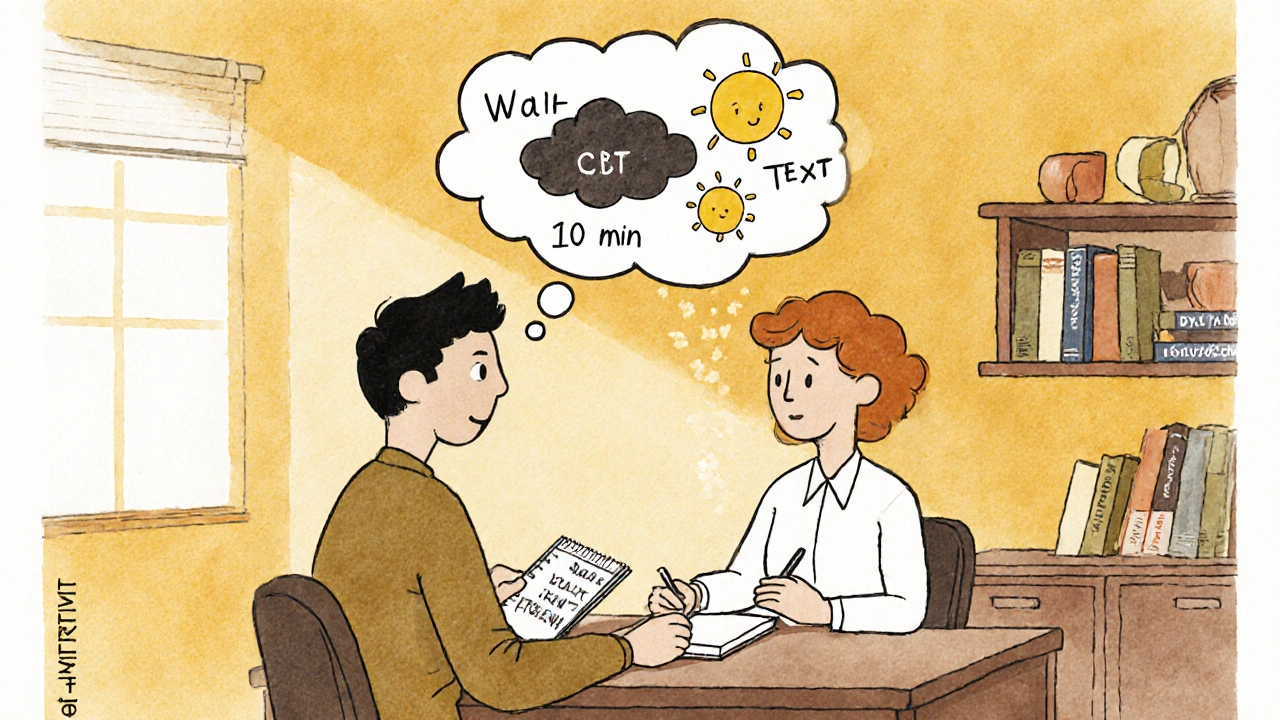
What if therapy doesn’t work right away?
It’s normal to feel frustrated after a few sessions. Therapy isn’t a quick fix. Some people feel worse before they feel better-especially when they start confronting painful memories or emotions they’ve buried. That doesn’t mean it’s not working. It means you’re moving through the layers.
But if after 8-10 sessions you feel no change at all, it’s time to reassess. Ask yourself:
- Do I feel heard by my therapist?
- Am I getting clear goals and homework?
- Is the approach being adjusted if it’s not helping?
If the answer is no, it’s okay to switch therapists. Not every therapist is a good fit. It’s like finding the right doctor-you wouldn’t stay with one who doesn’t listen. Try someone with a different style: more direct, more compassionate, more structured.
Also, therapy doesn’t always need to be in-person. Online therapy platforms with licensed clinicians have been shown to be just as effective as face-to-face sessions, especially for people with mobility issues, busy schedules, or stigma concerns.
Therapy works best with other support
Therapy alone can help-but combining it with other tools makes it stronger. People who do best are those who:
- Get regular physical activity-even a daily walk boosts serotonin and reduces inflammation linked to depression.
- Limit alcohol. It’s a depressant. It may numb feelings at first, but it deepens the low mood over time.
- Stick to a sleep schedule. Irregular sleep worsens emotional regulation.
- Connect with one trusted person. You don’t need a big social circle. One person who listens without trying to fix you makes a huge difference.
Medication can also play a role. If your symptoms are severe-like not being able to get out of bed for days-therapy and medication together are more effective than either alone. Therapy helps you manage the emotional side. Medication helps your brain have the energy to engage with therapy.
When to seek therapy for depression
You don’t need to hit rock bottom to get help. If you’ve been feeling off for more than two weeks, and it’s affecting your work, relationships, or daily routines, therapy is worth trying. You don’t need a diagnosis. You don’t need to be “bad enough.”
Early intervention is the most powerful tool against chronic depression. The longer symptoms go untreated, the more your brain learns to stay in that low state. Therapy interrupts that pattern before it becomes automatic.
Signs it’s time to talk to someone:
- You’ve lost interest in things you used to love.
- You’re crying more than usual-or not crying at all, but feeling numb.
- You’re avoiding friends, family, or responsibilities.
- You’re having trouble concentrating at work or school.
- You’ve had thoughts that life isn’t worth living.
If you’re having thoughts of self-harm or suicide, reach out immediately. Call or text 988 (Suicide & Crisis Lifeline). You are not alone. Help is available.
What to expect in your first therapy session
Therapy doesn’t start with deep revelations. The first session is usually about gathering information. Your therapist will ask:
- What brings you here?
- How long have you been feeling this way?
- What’s been helping, even a little?
- What’s your support system like?
They’re not judging you. They’re mapping your experience so they can help you navigate it. There’s no right or wrong answer. Even saying “I don’t know” is valid.
By the end, you’ll likely walk away with one small goal: “I’ll write down three things I did this week, even if they seem small.” That’s it. No pressure. Just a starting point.
Therapy is a skill-not a sign of weakness
People who go to therapy aren’t broken. They’re people who recognize that emotional pain needs attention, just like a sprained ankle. You wouldn’t ignore a broken leg. Why ignore a broken spirit?
Therapy teaches you how to manage your mind. That’s not weakness. That’s strength. It’s the same kind of strength it takes to learn a new language, train for a marathon, or rebuild after loss. You’re not failing. You’re learning.
Depression lies to you. It tells you you’re alone, that you’re too far gone, that nothing will help. But therapy has helped millions of people walk out of that darkness-not because they were magically cured, but because they learned how to carry the weight differently.
You don’t have to do it alone. And you don’t have to wait until you’re ready. You just have to show up.
Can therapy cure depression?
Therapy doesn’t “cure” depression like an antibiotic cures an infection. Instead, it helps you manage symptoms, understand triggers, and build resilience. Many people experience long-term relief, especially when they continue using the skills they learn. For some, depression returns later in life-but with therapy tools, relapses are shorter and less severe.
How long does therapy take to work for depression?
Most people start noticing small changes within 4 to 8 weeks. Significant improvement often happens by week 12. But progress isn’t linear. Some weeks feel better; others feel like setbacks. That’s normal. The goal isn’t to feel happy every day-it’s to feel more in control, less trapped, and more connected to yourself.
Do I need medication if I go to therapy?
Not always. For mild to moderate depression, therapy alone can be enough. For moderate to severe cases-especially if you’re struggling to get out of bed, eat, or sleep-medication can help create the stability needed to benefit from therapy. Many people start with therapy, then add medication if needed. Others do both from the start. It depends on your symptoms and history.
What if I can’t afford therapy?
Therapy doesn’t have to be expensive. Many community health centers offer sliding-scale fees based on income. University training clinics provide low-cost sessions with supervised students. Online platforms like Open Path Collective connect people with therapists charging $30-60 per session. Some employers offer free sessions through EAPs (Employee Assistance Programs). Don’t assume it’s out of reach-ask.
Can therapy help if I don’t have a diagnosis?
Yes. You don’t need a formal diagnosis to benefit from therapy. If you’re struggling with persistent sadness, fatigue, or hopelessness, therapy can help you feel better-even if you haven’t been labeled with depression. Therapists work with symptoms, not just labels.
If you’re reading this and thinking, “Maybe I should try therapy,” that’s already a step forward. You don’t need to have all the answers. You just need to be willing to ask the question-and show up.


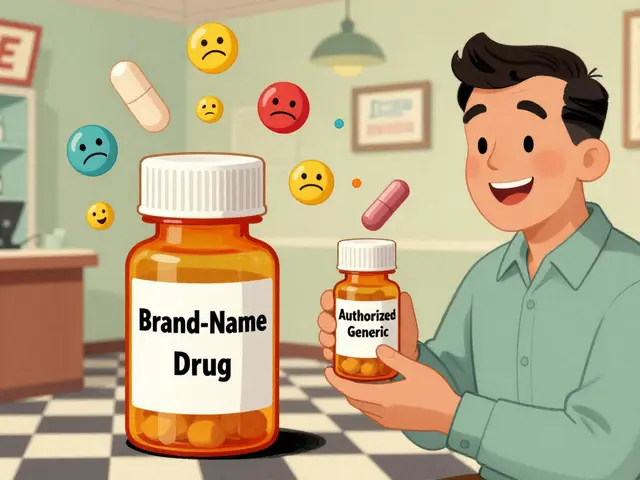
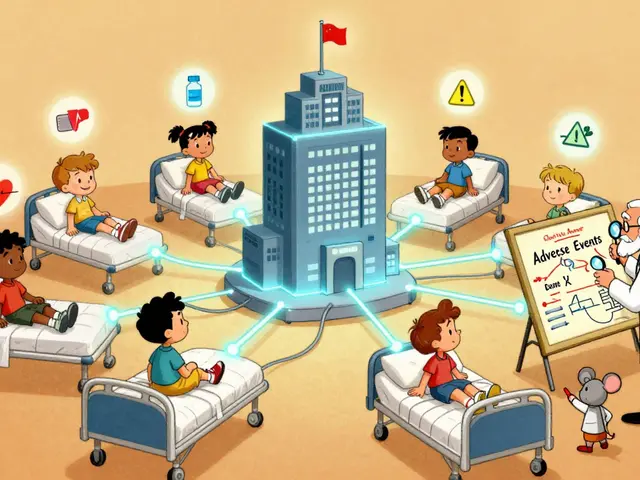
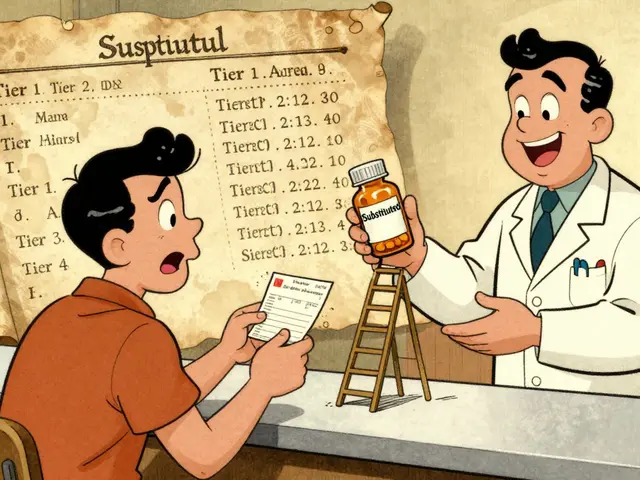
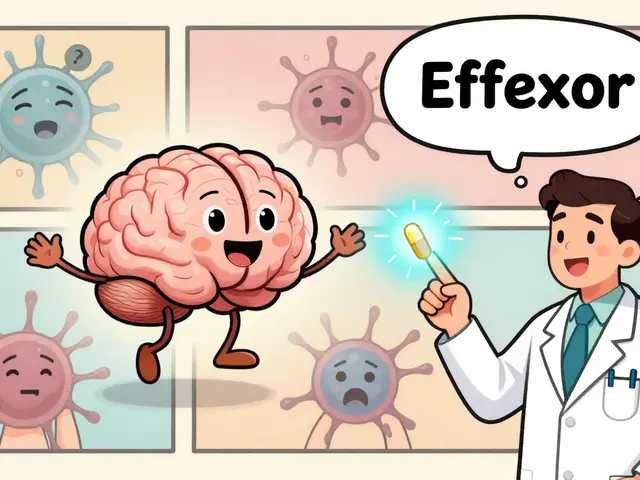
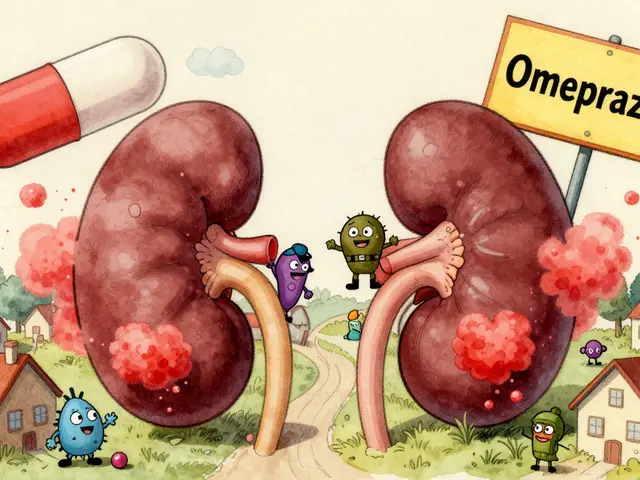
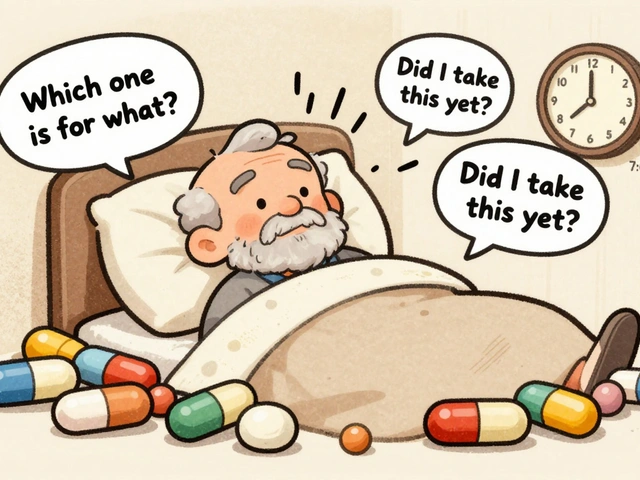
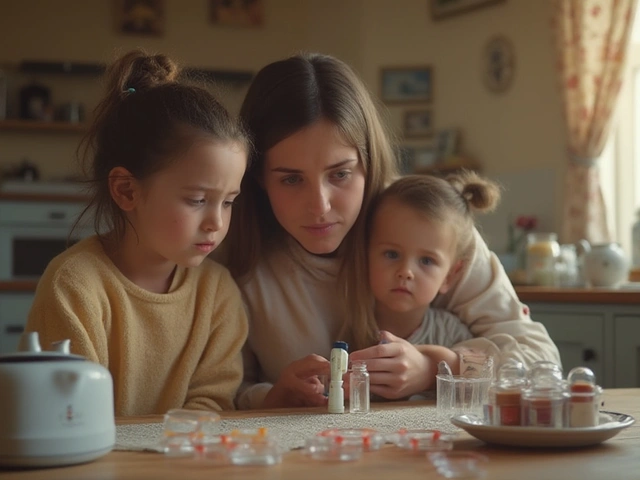
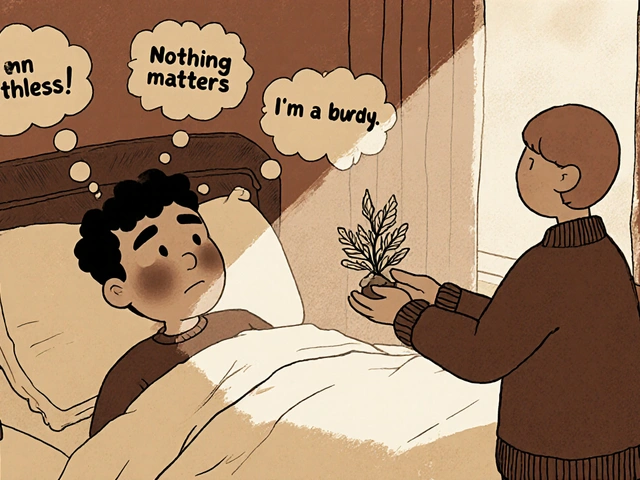
therapy is just corporate gaslighting dressed up as self-care. they charge you $200/hour to tell you to ‘reframe your thoughts’ while your rent goes up and your job eats your soul.
therapy doesn't cure depression it just teaches you how to be comfortable in your own prison. you learn to whisper your pain instead of screaming it. that's progress? maybe. but i'd rather burn the whole system down.
i was skeptical too until i started behavioral activation. no talking, just doing. got up at 7am, walked 10 mins, made coffee, sat in sunlight. didn't feel better right away but i stopped feeling like a ghost. small actions build momentum. it's not magic, it's math.
therapy is just the new religion for people who don't believe in god but still need a priest to tell them they're not broken
my first therapist asked me what i did last week that made me feel even a little alive. i said ‘i watered my plant.’ she said ‘that’s enough. let’s build from there.’ i cried. not because i was sad-because someone finally saw me.
if you're thinking about therapy but worried it won't work-just know this: the fact that you're even considering it means you're already fighting. therapy isn't the start of healing, it's the first time you let someone hold your hand while you keep fighting. no pressure, no expectations. just presence. that's more than most people ever get.
in Nigeria, we say ‘the mind is a garden.’ if you don’t tend to it, weeds take over. therapy is not a western luxury-it’s a necessary act of self-respect. i’ve seen men in Lagos sit in quiet rooms with counselors, not because they’re weak, but because they love their families enough to heal.
CBT is just cognitive manipulation disguised as science. your thoughts aren’t ‘distorted’-they’re honest reflections of a broken system. stop blaming your mind and start blaming the economy that made you feel worthless.
therapy is a scam designed by pharma and insurance companies to keep you docile. they don’t want you healed-they want you compliant. next thing you know you’re on meds and paying $150 a week to be told to ‘practice gratitude.’
you think therapy helps? in india we have grandmas who sit you down, feed you spicy chai, and say ‘life is pain, but you’re still here. that’s victory.’ no couches, no forms, no billing codes. just human warmth. maybe the west needs less analysis and more aunties.
what if depression isn’t a disorder to be fixed but a signal to be listened to? therapy doesn’t erase pain-it teaches you how to hold it without letting it define you. maybe the goal isn’t to feel happy, but to feel real. and that’s a revolution.
just fyi i did 6 months of therapy and it didn't help at all so i started taking nootropics and now i'm basically a productivity god. also i read this one book called The Subtle Art of Not Giving a F*ck and now i don't cry anymore. just saying.
therapy is fire 🔥 but only if your therapist isn’t a robot who says ‘tell me more’ 12 times and then charges you $200. also if you’re not doing journaling or breathwork you’re doing it wrong 💨
did you know the American Psychiatric Association is funded by pharmaceutical companies? therapy is just the soft sell. they want you dependent-not healed. they’re selling you a lifetime subscription to pain management. don’t be fooled.